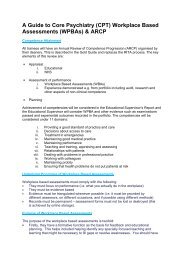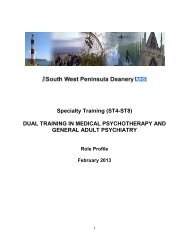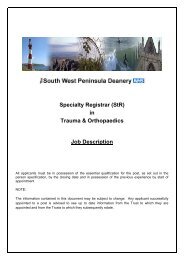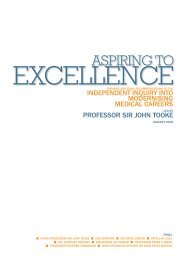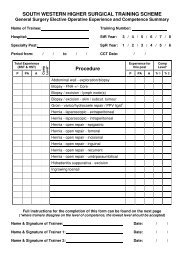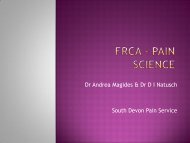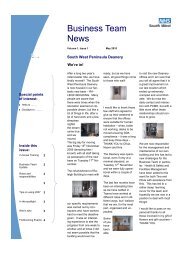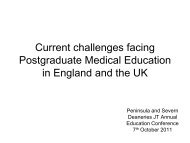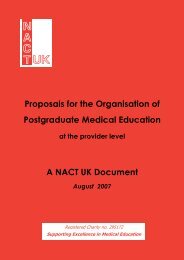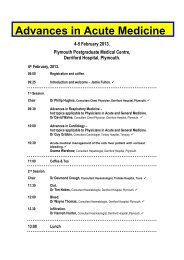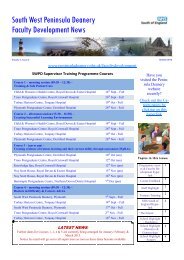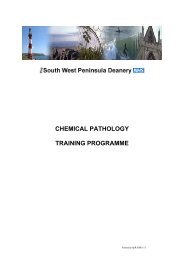Paediatrics: ST1, ST2 and ST3 level Job Description - South West ...
Paediatrics: ST1, ST2 and ST3 level Job Description - South West ...
Paediatrics: ST1, ST2 and ST3 level Job Description - South West ...
Create successful ePaper yourself
Turn your PDF publications into a flip-book with our unique Google optimized e-Paper software.
<strong>Paediatrics</strong>: <strong>ST1</strong>, <strong>ST2</strong> <strong>and</strong> <strong>ST3</strong> <strong>level</strong><br />
<strong>Job</strong> <strong>Description</strong><br />
January 2010
PAEDIATRICS: <strong>ST1</strong>, <strong>ST2</strong> & <strong>ST3</strong><br />
PROGRAMME DESCRIPTION<br />
The <strong>South</strong> <strong>West</strong> Peninsula Deanery offers Paediatric training at <strong>ST1</strong>, <strong>ST2</strong> <strong>and</strong> <strong>ST3</strong><br />
<strong>level</strong>.<br />
The Trusts offering these programmes are as follows:<br />
• Plymouth Hospitals NHS Trust<br />
(http://www.plymouthhospitals.nhs.uk/Pages/Home.aspx)<br />
• Royal Devon <strong>and</strong> Exeter NHS Foundation Trust<br />
(http://www.rdehospital.nhs.uk/)<br />
• <strong>South</strong> Devon Healthcare NHS Trust<br />
(http://www.sdhct.nhs.uk/)<br />
• Northern Devon Healthcare NHS Trust<br />
(http://www.northdevonhealth.nhs.uk/)<br />
• Royal Cornwall Hospitals NHS Trust<br />
(http://www.rcht.nhs.uk/RoyalCornwallHospitalsTrust/)<br />
Initial appointment at <strong>ST1</strong> <strong>level</strong> will normally be in Plymouth, Exeter or Cornwall.<br />
These placements will usually be for 24 months. The next 12 months will be provided<br />
through rotation to placements at some of the other Trusts. Precise arrangements for<br />
the 12 months will depend on the vacancies available <strong>and</strong> the assessed training<br />
needs of the individuals. There is the expectation of experience in the smaller DGH’s<br />
where there is greater responsibility <strong>and</strong> also “<strong>level</strong> 3 Neonatology at Plymouth.<br />
At ST4 trainees will be expected to gain the necessary experience <strong>and</strong><br />
competencies outlined in “A framework of Competencies for Core Higher specialist<br />
training in <strong>Paediatrics</strong> (RCPCH 2005). To achieve this placements will normally be<br />
for 2 years <strong>and</strong> may involve rotation between two of the Trusts in the Peninsula.<br />
During ST6 <strong>and</strong> ST7 most trainees from the Peninsula will be expected to spend<br />
some time in sub-speciliaty training posts based in the Severn Deanery. These are<br />
in Bath <strong>and</strong> Bristol. Some sub-speciality training is also provided within the<br />
Peninsula.<br />
For your ST8 year you will be expected to return to the Peninsula rotation.<br />
The length of time in each post may vary <strong>and</strong> is dependant on training needs of<br />
individuals within the rotation <strong>and</strong> acquisition of necessary competencies.<br />
2
Duties <strong>and</strong> responsibilities throughout the rotations<br />
There will be minor variations in different posts in different hospitals but this list is<br />
aimed at covering the majority of duties:<br />
1. Supervise, monitor <strong>and</strong> assist the F1 doctor in the day-to-day management of inpatients<br />
in posts with an attached F1.<br />
2. Maintain good liaison between patients, relatives & carer’s, nurses, other junior<br />
medical staff, senior medical staff <strong>and</strong> such other Trust <strong>and</strong> community based<br />
staff as is necessary.<br />
3. Attend <strong>and</strong> participate in ward rounds as timetabled<br />
4. Attend outpatient clinics as timetabled.<br />
5. Take part in rostered on call <strong>and</strong> emergency work.<br />
6. Maintain good communication with professional colleagues through telephone<br />
calls, dictated discharge summaries <strong>and</strong> letters as appropriate..<br />
7. Study for higher examination’s <strong>and</strong> maintain continued professional development<br />
which will be evidenced through the personal portfolio.<br />
8. Attend any timetabled educational <strong>and</strong> multidisciplinary sessions.<br />
9. Participate in Trust Clinical Governance activity <strong>and</strong> in particular undertake<br />
audit’s regularly throughout the rotations.<br />
10. Participate in all necessary assessments <strong>and</strong> appraisals.<br />
11. Support <strong>and</strong> teach attached medical students as directed.<br />
12. Co-operate with members of the personnel department when monitoring hours of<br />
work <strong>and</strong> other personnel issues.<br />
13. Attend induction in each hospital or new department<br />
14. Comply with all local policies including dress code, annual <strong>and</strong> study leave<br />
Related Sites<br />
• The Royal College of <strong>Paediatrics</strong> <strong>and</strong> Child Health<br />
http://www.rcpch.ac.uk/<br />
3
Barnstaple<br />
Medical Staff<br />
Consultants<br />
Dr J Cox<br />
Dr A Arend<br />
Dr A Bosley<br />
Dr Rebecca Rub<br />
Dr Jonathan Walsh<br />
New post - community<br />
Special interest<br />
diabetes<br />
neurology<br />
cystic fibrosis, respiratory<br />
Other Paediatric Hospital Staff<br />
Staff Grade 3<br />
ST4-8 1<br />
<strong>ST3</strong> 3<br />
GP VTS 3<br />
Postgraduate Education<br />
The library in the hospital has a large stock of Paediatric texts <strong>and</strong> journals. The staff<br />
are efficient <strong>and</strong> helpful with any requests for information.<br />
There is an active teaching programme for junior staff which includes both clinical<br />
<strong>and</strong> non clinical aspects of paediatrics, guidance on teaching methods <strong>and</strong> applying<br />
evidence based medicine.<br />
Within the Medical Education Centre you can hire rooms, audio visual equipment,<br />
obtain help with presentations, apply for study leave <strong>and</strong> expenses, borrow videos<br />
<strong>and</strong> CD Roms, use video editing facilities <strong>and</strong> use networked computers. The<br />
majority of undergraduate <strong>and</strong> postgraduate teaching sessions take place here.<br />
RCPCH Tutor<br />
Dr Rebecca Rub.<br />
4
Exeter<br />
General Information<br />
Acute paediatric services are based at the Royal Devon <strong>and</strong> Exeter Hospital<br />
(Wonford) <strong>and</strong> Neonatology has now moved to a purpose built unit on the Wonford<br />
Hospital site. We serve a catchment population of 350,000 with 75,000 children<br />
aged 0-16 years. There are 49 acute paediatric beds including four for high<br />
dependency <strong>and</strong> a six bedded day case unit. Paediatric oncology <strong>and</strong> cystic fibrosis<br />
services are multidisciplinary <strong>and</strong> provide hospital care <strong>and</strong> community back up for<br />
patients from both the Exeter <strong>and</strong> Torbay districts. General <strong>and</strong> specialist surgery is<br />
accommodated on the acute ward <strong>and</strong> includes plastics, ENT, maxillo-facial,<br />
ophthalmology <strong>and</strong> orthopaedics. There are paediatric trained consultants in<br />
ophthalmology <strong>and</strong> orthopaedics. General paediatric <strong>and</strong> Neonatal consultant cover<br />
during working hours <strong>and</strong> at weekends is based on a 4day/3day split week on<br />
service model.<br />
Neonatal intensive care is provided as part of the Peninsula Neonatal Network in<br />
which the <strong>level</strong> 3 unit is based in Plymouth. We cater for 3,500 deliveries including<br />
those in three community midwifery led units. There is a foetal medicine unit, <strong>and</strong><br />
fertility treatment, <strong>and</strong> an excellent relationship with the maternity services. We take<br />
all infants ≥26 weeks gestation, offer ventilation, oscillation, total body cooling on the<br />
TOBY register. Day time cover is provided by a week on service model by the<br />
consultants with a neonatal interest as well as an associate specialist. There is night<br />
time cover from a separate rota of neonatal consultants.<br />
Community paediatric services are based in the 3 community Joint Agency Teams<br />
<strong>and</strong> at Newcourt House. There is regular consultant community paediatric input into<br />
the workings of the Joint Agency Teams. The Honeyl<strong>and</strong>s Child Development Centre<br />
provides a multidisciplinary assessment <strong>and</strong> therapy for pre-school children along<br />
with respite care for children up to the age of 12 yrs. Amongst the numerous special<br />
schools are the School for the Physically H<strong>and</strong>icapped (Vranch House), adjacent to<br />
Honeyl<strong>and</strong>s, The Royal School for the Deaf <strong>and</strong> the <strong>West</strong> of Engl<strong>and</strong> School for<br />
Children with Little or No Sight.<br />
Medical Staff<br />
Consultants<br />
Dr Vaughan Lewis<br />
Dr Patrick Oades<br />
Dr Andrew McNinch<br />
Dr Ron Smith<br />
Dr Michael Quinn<br />
Dr Corinne Hayes<br />
Dr Andrew Collinson<br />
Dr David Mabin<br />
Dr Richard Tomlinson<br />
Dr Hazel Curtis<br />
Dr Nigel Osborne<br />
Dr James Hart<br />
Dr Simon Robertson<br />
Dr Emma Davis<br />
Dr Karen Street<br />
Dr Simon Parke<br />
Special Interest(s)<br />
Lead Clinician, General paeds, neonates, nephrology<br />
Respiratory, Cystic Fibrosis<br />
Endocrine, general paediatrics<br />
Community (Exeter)<br />
Head of School Neonatology, neurodisability<br />
Paediatric Oncology, General paediatrics<br />
General paeds, immunology, neonatology<br />
PMS, Cardiology, Neonatology<br />
Community (Mid-Devon), Neurodisability, Gen paeds<br />
Community (Honeyl<strong>and</strong>s Children’s Centre)<br />
Neonatal, cardiology, rheumatology<br />
General paeds, neonatology, Gastroenterology, PMS<br />
College Tutor, General Paeds, Diabetes, CF<br />
General Paeds, Diabetes, Endocrinology<br />
General paeds, Community paeds, ED Liaison<br />
Paediatric Oncology, General Paeds<br />
5
Postgraduate Education<br />
There is a new state of the art medical library based in the newly built Peninsula<br />
Medical School building on the Wonford site. There are weekly hospital gr<strong>and</strong><br />
rounds, weekly neonatal <strong>and</strong> acute paediatric departmental teaching afternoons <strong>and</strong><br />
regular community child health meetings <strong>and</strong> teaching sessions. In addition there are<br />
regular meetings for radiology, tertiary neurology, joint ED, resuscitation scenarios,<br />
M+M, Drug <strong>and</strong> Bug, <strong>and</strong> a joint maternity <strong>and</strong> neonatal weekly meeting.<br />
RCPCH District Tutor – Dr Simon Robertson<br />
6
Plymouth<br />
General Information<br />
Child health services are provided for a population of approximately 100,000 children<br />
<strong>and</strong> adolescents under the age of 16 years living in <strong>West</strong> Devon <strong>and</strong> East Cornwall.<br />
In addition, the neonatal service is the tertiary service provider for the whole<br />
Peninsula. Plymouth is the largest city west of Bristol situated in an otherwise rural<br />
area. As such the catchment profile includes a large under-privileged inner-city<br />
population <strong>and</strong> areas of rural deprivation. The clinical experience available is<br />
enormous.<br />
The Department of Hospital <strong>Paediatrics</strong> moved to accommodation at Derriford<br />
Hospital in January 1994. Babies, children <strong>and</strong> teenagers with medical <strong>and</strong> surgical<br />
problems are cared for on the 12 th floor of the main hospital tower. There are two<br />
main wards (Woodcock <strong>and</strong> Wildgoose). In addition, there is a Paediatric High<br />
Dependency Unit capable of providing non-invasive ventilatory support, a dedicated<br />
Children’s Admission <strong>and</strong> Assessment Unit (Whitehorse Ward) <strong>and</strong> a Children <strong>and</strong><br />
Young People’s Unit providing outpatient <strong>and</strong> day care facilities.<br />
In addition to general paediatric outpatient clinics, the Plymouth paediatricians hold<br />
special interest clinics in asthma, cardiology, cystic fibrosis, diabetes, epilepsy,<br />
allergy, headache, metabolic paediatrics, gastroenterology, growth & endocrinology<br />
<strong>and</strong> oncology. Combined clinics are held with Plymouth consultants in haematology,<br />
rheumatology, immunology, audiology <strong>and</strong> congenital hip disorders. Visiting subspecialty<br />
paediatricians hold combined clinics in cardiology, nephrology, paediatric<br />
surgery, urology, oncology, endocrinology, neurology, neuromuscular disease,<br />
plastic surgery / cleft lip & palate management <strong>and</strong> metabolic medicine.<br />
The Department of Neonatal Medicine is based in the Neonatal Intensive Care Unit<br />
(NICU) situated on Level 5 of the Maternity Wing within the main hospital.<br />
Approximately 4,700 babies are born in Plymouth each year. Plymouth is the<br />
designated Level 3 facility for neonatal intensive care within the <strong>South</strong> <strong>West</strong><br />
Peninsula. 2005 saw a significant uplift in senior medical <strong>and</strong> nurse staffing of the<br />
service <strong>and</strong> the NICU has seen a year on year increase in ICU/HDU activity following<br />
strategic realignment of referrals for care of both the most pre-term infants <strong>and</strong> also<br />
sick term infants with multi-system dysfunction. The unit plays a pivotal role in<br />
neonatal transport for the Peninsula undertaking >90% of all moves (240 transports<br />
undertaken in 2007). The unit provides full intensive medical care, including<br />
oscillatory ventilation, inhaled nitric oxide, total body cooling <strong>and</strong> cerebral function<br />
monitoring for all babies. Those with major surgical or cardiac problems are<br />
transferred to appropriate tertiary centres for ongoing support. Training in cranial,<br />
cardiac <strong>and</strong> hip ultrasound is available, with opportunities to participate in neonatal<br />
follow-up, cardiology, neuro-developmental, genetics <strong>and</strong> hip clinics. A 20-bed<br />
Transitional Care Ward is situated adjacent to NICU, which provides augmented<br />
care over <strong>and</strong> above routine post-natal requirements for babies beyond 34 weeks<br />
gestation alongside their mothers.<br />
Community services are centred on the Plymouth Child Development Centre located<br />
at Scott Hospital. Experience may be gained in Child protection work, adoption <strong>and</strong><br />
fostering, audiology, child health surveillance, immunisation, neurodevelopment <strong>and</strong><br />
disability clinics. Facilities are provided in purpose-built accommodation, which<br />
allows the multidisciplinary assessment, investigation, <strong>and</strong> management of children<br />
with neuro-developmental problems including hearing <strong>and</strong> vision difficulties. The<br />
7
service also holds clinics in special schools.<br />
Medical Staff<br />
Consultants<br />
Dr CR Adcock<br />
Dr ACL Allwood<br />
Dr A Cade<br />
Dr AJ Cronin<br />
Dr J Eason<br />
Dr S. Glass<br />
Dr I. Guarino (locum)<br />
Dr R Howells<br />
Dr RWA Jones<br />
Dr JA Lilley<br />
Dr T Lopez<br />
Dr RJ Madar<br />
Dr N Maxwell<br />
Dr GL Richardson<br />
Dr R Smith<br />
Dr P Sundaram<br />
Dr PS Ward<br />
Dr. R Vaitkute<br />
Dr D Vinthagen<br />
Specialist interest<br />
General paediatrics, epilepsy<br />
Neonatology, cardiology, medical education,<br />
medical informatics<br />
Respiratory paediatrics, general paediatrics,<br />
allergy, RCPCH tutor<br />
Neuro-developmental paediatrics & community<br />
child health, immunisation, general paediatrics<br />
Neonatology, cardiology, infant nutrition, medical<br />
education, clinical director for neonatology, GUM,<br />
O&G <strong>and</strong> breast<br />
Community child health<br />
Community child health, general paediatrics<br />
Neurology, intensive care, general paediatrics,<br />
medical education<br />
General paediatrics, nephro-urology, epilepsy,<br />
rheumatology<br />
Neonatology, neurodevelopmental outcome,<br />
General paediatrics, gastroenterology, Lead<br />
Paediatrician for Peninsula Medical School<br />
Neonatology, cardiology, Medical Director of<br />
Peninsula Neonatal Care Network<br />
Neonatology, Research, medical education<br />
Neonatology, respiratory, medical education<br />
Diabetes, Endocrine, medical education<br />
Diabetes, Metabolic, medical education<br />
Paediatric oncology, growth & endocrinology,<br />
general paediatrics, Clinical Director <strong>Paediatrics</strong><br />
Neonatology, hips, medical education<br />
Community child health, allergy, medical<br />
education<br />
Trainees<br />
<strong>ST1</strong>-3 7<br />
ST4-8 10<br />
Postgraduate Education<br />
The new Peninsula Medical School has resulted in medical education achieving a<br />
very high profile within the department. Trainees are encouraged to participate in the<br />
provision of undergraduate paediatric teaching. In addition to a full range of<br />
8
departmental activities, opportunities exist to undertake higher degrees in, for<br />
example, medical education, clinical sciences <strong>and</strong> health service management under<br />
the aegis of the University of Plymouth. IT facilities are readily available <strong>and</strong> allow<br />
access to many on-line resources. The postgraduate centre within the hospital<br />
grounds provides a venue for many educational activities including APLS, PLS, NLS<br />
<strong>and</strong> GIC courses.<br />
Trainees have a named educational supervisor <strong>and</strong> are issued with the locally<br />
produced, regularly updated guidelines. The regular departmental activities are<br />
timetabled below, in addition to which are many other meetings.<br />
Monday 13.00 – 14.00 Paediatric X-ray Meeting (Neuro<br />
monthly)<br />
Tuesday 08.30 – 09.30<br />
09.00 – 10.00<br />
13.00 – 14.00 (1 st )<br />
13.00 – 14.00 (2 nd<br />
/4 th )<br />
Evidence Based Medicine /<br />
Journal Club<br />
PMS neonatal undergraduate<br />
teaching<br />
Perinatal Morbidity/Mortality<br />
Fetal medicine meeting<br />
Wednesday 08.30 – 09.30<br />
12.30 – 13.30<br />
13.00 – 14.00<br />
Thursday 08.30 – 09.30<br />
12.30 – 13.30<br />
15.00 – 16.00<br />
Friday 08.30 – 09.30<br />
13.30 – 15.30<br />
SHO teaching: Neonatology<br />
NICU / TCW Child in Need<br />
Meeting<br />
Middle Grade Teaching<br />
Clinical Presentations / Child<br />
Protection<br />
Neonatal imaging meeting<br />
Neonatal middle grade teaching<br />
(protected)<br />
Neonatal Gr<strong>and</strong> Round<br />
SHO Teaching: <strong>Paediatrics</strong><br />
(Protected)<br />
The programme of activities is under continuous review by the Directorate Education<br />
& Training Steering Group (general paediatric <strong>and</strong> neonatal representation) <strong>and</strong><br />
College Tutor <strong>and</strong> is subject to change.<br />
Higher Specialist Trainees are allocated a place on a multi-disciplinary Level 1 Child<br />
Protection Course as early in their appointment as is practicable.<br />
RCPCH District Tutor – Dr Alan Cade<br />
9
Torbay<br />
General Information<br />
Acute Paediatric services are based at Torbay Hospital, a medium sized District<br />
General Hospital of 669 beds serving a catchment population of around 250,000 <strong>and</strong><br />
a Paediatric population of around 55,000. There is a significant increase in the<br />
population in the holiday season.<br />
In-patient care for acutely unwell children is provided on the recently refurbished<br />
Louisa Cary ward, which is a 32 bed/cot ward <strong>and</strong> is used by other specialities<br />
including general surgery <strong>and</strong> orthopaedics. This includes a newly built addition to<br />
the main ward (commissioned Nov 2005) <strong>and</strong> comprises an adolescent unit, an<br />
assessment <strong>and</strong> diagnosis unit, parents rooms <strong>and</strong> Doctors’ working <strong>and</strong> on call<br />
rooms. An additional in-patient area for children, the John Parkes Unit, is located<br />
just off-site <strong>and</strong> provides care for 8 children with special needs <strong>and</strong> chronic <strong>and</strong> subacute<br />
conditions. Three of these 8 beds are used for medical respite for severely<br />
h<strong>and</strong>icapped children. The Special Care Baby Unit is managed by Obstetrics but inpatient<br />
care is supervised <strong>and</strong> given by the <strong>Paediatrics</strong> team <strong>and</strong> provides 10 cots.<br />
Neonatal Intensive Care is provided at the Derriford Hospital, Plymouth <strong>and</strong> the two<br />
units work in close co-operation. Transfers between units are usually undertaken by<br />
a team from Derriford.<br />
Community <strong>Paediatrics</strong> is a strong specialty in Torbay. Services are based at the<br />
Child Development Centre on the John Parkes Unit. Community support to children<br />
with special needs in special schools is provided by a team of Associate Specialists<br />
& SCMO’s & supported by two Community Consultants, Dr Dibble <strong>and</strong> Dr Singh.<br />
Medical Staff<br />
Consultants<br />
Dr C Sainsbury<br />
Dr J Broomhall<br />
Dr A Janzen<br />
Dr S Imong<br />
Dr B Fraser<br />
Dr L Dibble<br />
Dr B Singh<br />
Tutor<br />
Special Interest(s)<br />
Cystic fibrosis , Rheumatology<br />
Diabetes <strong>and</strong> endocrinology;<br />
Nephrology,<br />
Neonatology, gastroenterology, Clinical Director<br />
Respiratory <strong>and</strong> A/ E Liaison<br />
Community paediatrics, Child protection<br />
Community paediatrics, Disability <strong>and</strong> Epilepsy, RCPCH<br />
Trainees<br />
<strong>ST1</strong>-2 2<br />
ST4-8 3<br />
Postgraduate Education<br />
There is an active post-graduate medical centre with a well-stocked library. The<br />
library has six computers with internet access. There is a Weekly hospital gr<strong>and</strong><br />
round. There are weekly Friday morning Clinical meetings in <strong>Paediatrics</strong> as well as<br />
structured <strong>ST1</strong>-3 teaching on Thursday morning as well as weekly Clinical<br />
Governance meetings. There is weekly Monday mornings ST4-8 teaching. Trainees<br />
are also expected to attend monthly regional study days. There is also a bi monthly<br />
Paediatric X-Ray meeting, monthly audit <strong>and</strong> perinatal meet. Trainees are expected<br />
to participate in audit , presentation at clinical meetings <strong>and</strong> take an active part in<br />
10
teaching. Study leave for special interests <strong>and</strong> exams are strongly supported<br />
RCPCH District Tutor – Dr Alison Jansen<br />
11
Truro<br />
General Information<br />
Royal Cornwall Hospital Trust is the main acute health provider for over 385,000 of<br />
Cornwall’s 500,000 residents. Community Paediatric Services are provided for the<br />
whole of Cornwall for children aged 0-16 years (a population in excess of 100,000).<br />
The Child Health Directorate is responsible for acute paediatric services for all<br />
children <strong>and</strong> young people up to their 17th birthday <strong>and</strong> is based at the Royal<br />
Cornwall Hospital (Treliske).<br />
The Department offers wide experience of the whole range of General <strong>Paediatrics</strong><br />
including high dependency <strong>and</strong> intensive care. Acute admissions into the recently<br />
opened 50 bedded Children’s Unit are distributed between 2 wards with an additional<br />
14-bedded specialist surgical ward. A separate medical day case (4 beds) <strong>and</strong><br />
outpatient facility opened in December 2000.<br />
Recent departmental activity included 7,583 admissions, 2,080 new outpatients <strong>and</strong><br />
7,816 follow ups.<br />
The 20-cot (7 ICU) Neonatal Unit serves some 4,000 deliveries per annum. Recent<br />
activity <strong>level</strong>s were over 400 admissions with some 70 infants ventilated. The<br />
Neonatal Unit is capable of high frequency oscillation ventilation <strong>and</strong> the use of nitric<br />
oxide. One of the Obstetricians has a special interest in foetal medicine. There are<br />
good ultrasound diagnostic facilities.<br />
There are 4 Community Assessment Units with a completely new <strong>and</strong> updated<br />
facility on the Treliske site. There are 4 special schools. Cornwall has a large number<br />
of children with special needs integrated into mainstream schools. Cornwall has<br />
been at the forefront of developing collaborative services for children subject to<br />
abuse or neglect <strong>and</strong> the multidisciplinary Joint Consultancy Team based on the<br />
Treliske site is the focus of this collaboration.<br />
Medical Staff<br />
Consultants<br />
Hospital Based<br />
Dr John Ellis<br />
Dr Nicki Gilbertson<br />
Dr Sian Harris<br />
Dr Paul Munyard<br />
Dr Yadlapalli Kumar<br />
Dr Ann Prendiville<br />
Dr Graham Taylor<br />
Dr Matt Thorpe<br />
Dr Katie Mallam<br />
Dr Chris Williams<br />
Community Based<br />
Dr Roger Jenkin<br />
Dr Jo Lewis<br />
Dr John Lewis<br />
Dr Eleanor McCartney<br />
Dr Debbie Galbraith (SCMO)<br />
Special Interest(s)<br />
Cardiology<br />
Oncology<br />
Haematology & Oncology<br />
Neonatology<br />
Neonatology, Endocrinology<br />
Respiratory diseases <strong>and</strong> Cystic Fibrosis<br />
Diabetes, Lipidology & Rheumatology<br />
Education & Gastroenterology<br />
Diabetes<br />
Gen <strong>Paediatrics</strong> & Education<br />
Neurodisability<br />
Social <strong>Paediatrics</strong> / education<br />
Population <strong>Paediatrics</strong><br />
Looked After Children<br />
Child Protection<br />
12
Trainees<br />
<strong>ST1</strong>-2 6<br />
ST4-8 7<br />
Postgraduate Education<br />
There is a modern Postgraduate Centre on the Hospital site. It has a well-stocked<br />
medical library with well-qualified full time librarians <strong>and</strong> support staff. There is on<br />
line information retrieval services as well as Medline, Cochrane Library <strong>and</strong> British<br />
Nursing Index on CD-Rom. There is Internet access both from the Library <strong>and</strong><br />
elsewhere in the hospital available to all junior medical staff. Computers for general<br />
use are available within the library itself <strong>and</strong> also within the Child Health Directorate.<br />
Within the Department there are regular weekly clinical meetings including one with<br />
Clinical Imaging <strong>and</strong> also a Journal Club. In addition, there are regular daily teaching<br />
sessions for trainees. Trainees also attend the monthly regional teaching sessions.<br />
There are monthly perinatal mortality <strong>and</strong> separate perinatal morbidity meetings.<br />
Audit <strong>and</strong> Clinical Governance meetings alternate bi-monthly. There is a hospital<br />
induction programme for all staff <strong>and</strong> a specific departmental induction programme<br />
for trainees on taking up their appointments. The Department is committed to the<br />
development of training opportunities for all grades of staff.<br />
RCPCH District Tutor -<br />
Dr Matt Thorpe<br />
13
General Information<br />
This document forms part of the job description for Specialist Trainees working in the<br />
<strong>South</strong> <strong>West</strong> Peninsula Deanery.<br />
The Terms <strong>and</strong> Conditions of Employment (including those related to leave <strong>and</strong> sick<br />
pay) are in accordance with the nationally agreed Terms <strong>and</strong> Conditions of Service<br />
of Hospital Medical <strong>and</strong> Dental Staff (Engl<strong>and</strong> <strong>and</strong> Wales) <strong>and</strong> General Whitley<br />
Council Conditions of Service currently in force <strong>and</strong> as amended from time to time.<br />
Appointments are superannuable unless you opt out of the scheme or are ineligible<br />
to join, <strong>and</strong> your remuneration will be subject to declaration of superannuable<br />
contributions in accordance with the National Health Services Superannuation<br />
Scheme.<br />
Hours of Work<br />
Your duty hours will be between 40 <strong>and</strong> 56 hours per week (part-time staff pro rata)<br />
depending upon the pattern of work offered by the employer, which should be in<br />
accordance with paragraph 20 of the TCS. This may include work in the evenings, at<br />
night <strong>and</strong> weekends. The TCS may be viewed at http://www.nhsemployers.org/payconditions/pay-conditions-467.cfm<br />
Salary scale<br />
You should be paid monthly at the rates set out in the national terms <strong>and</strong> conditions<br />
of service for hospital medical <strong>and</strong> dental staff <strong>and</strong> doctors in public health medicine<br />
<strong>and</strong> the community health service (Engl<strong>and</strong> <strong>and</strong> Wales), “the TCS”, as amended<br />
from time to time. The payscales are reviewed annually. Current rates of pay may be<br />
viewed at http://www.nhsemployers.org/pay-conditions/pay-conditions-2339.cfm.<br />
Part-time posts will be paid pro-rata.<br />
Pay supplement<br />
Depending upon the working pattern <strong>and</strong> hours of duty you are contracted to<br />
undertake by the employer you should be paid a monthly additional pay supplement<br />
at the rates set out in paragraph 22 of the TCS. The current payscales may be<br />
viewed at http://www.nhsemployers.org/pay-conditions/pay-conditions-2339.cfm. The<br />
pay supplement is not reckonable for NHS pension purposes. The pay supplement<br />
will be determined by the employer <strong>and</strong> subject to monitoring.<br />
Study Leave<br />
The employer is expected to offer study leave in accordance with paragraphs 250 –<br />
254 of the TCS. Local policy <strong>and</strong> procedure will be explained at induction.<br />
Assessment of Training<br />
Training appointments are subject to regular local <strong>and</strong> annual assessment<br />
confirming satisfactory progress through the programme. The requirements of the<br />
14
assessments will be detailed in the “Gold Guide” which may be viewed at<br />
http://www.mmc.nhs.uk/default.aspx?page=457.<br />
Disclosure of Criminal Background<br />
This position is exempt from the Rehabilitation of Offenders Act 1974. This means<br />
that you must declare all criminal convictions, including those that you would<br />
otherwise be considered “spent”.<br />
Where the appointment involves substantial access to children <strong>and</strong>/or vulnerable<br />
adults, the appointment is subject to a police check. The Criminal Records Bureau<br />
will be asked to verify that you have no convictions <strong>and</strong> cautions or pending<br />
prosecutions, convictions, cautions <strong>and</strong> bind-over orders. This will include local<br />
police force records in addition to checks with the Police National Computer <strong>and</strong> the<br />
government departments lists held by the Department of Health for Education <strong>and</strong><br />
Employment, where appropriate.<br />
Police checks will only be requested for c<strong>and</strong>idates recommended for appointment<br />
<strong>and</strong> will be carried out by the employing Trust.<br />
Medical Clearance<br />
Offers of employment to the rotation will be subject to satisfactory medical clearance<br />
including Hepatitis B status.<br />
Medical checks will only be requested for c<strong>and</strong>idates recommended for appointment<br />
<strong>and</strong> will be carried out by the employing Trust.<br />
Relocation Expenses<br />
The employer will have a local policy for relocation expenses based on paragraphs<br />
314 – 315 of the TCS <strong>and</strong> national guidance at http://www.nhsemployers.org/payconditions/pay-conditions-467.cfm.<br />
You are advised to check eligibility <strong>and</strong> confirm<br />
any entitlement with the employer before incurring any expenditure. The current<br />
Relocation Expenses guidelines can be accessed via the <strong>South</strong> <strong>West</strong> Peninsula<br />
Deanery website (www.peninsuladeanery.nhs.uk).<br />
Less Than Full Time Working<br />
Less than full time working is available for doctors in the training grades for whom<br />
full-time training is not practical for “well-founded individual reasons”. However the<br />
funding for flexible training is a finite resource <strong>and</strong> it may be necessary to place<br />
applicants in an order of priority. A copy of the “Less Than Full Time Working” policy<br />
can be obtained from the <strong>South</strong> <strong>West</strong> Peninsula Deanery website<br />
(www.peninsuladeanery.nhs.uk). Doctors wishing to work on a less than full time<br />
basis should be aware that they will be expected to “slot share” with another less<br />
than full time trainee.<br />
Amended 05/10/09 (YK)<br />
15



